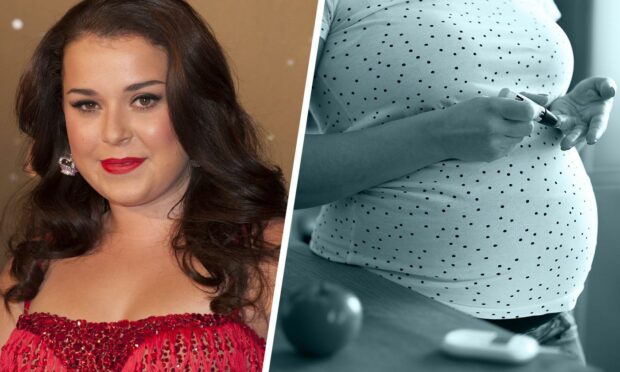Pregnancy can be a worrying time for women concerned about the health of their unborn child.
But there are also potential complications to look out for in mums-to-be too.
Some women can develop diabetes while carrying their child and be affected despite having no history of the condition.
Dani Harmer, best known for playing mischievous foster care child Tracy Beaker in the hit CBBC series, has revealed she has now been diagnosed.
The 32-year-old actress said on her Instagram it was not the way she wanted to end the pregnancy but that she’s glad she found out when she did.
The symptoms
In most cases, those with gestational diabetes don’t show any symptoms and it’s only detected through blood sugar level tests.
However, some women experience an increase in thirst, tiredness, a dry mouth or a need to urinate more frequently.

Although, these symptoms can be common during pregnancy and don’t necessarily confirm you have gestational diabetes.
Who is at risk?
Any pregnant woman can develop gestational diabetes.
However, there are certain factors that can make it more likely to occur.
You are more at risk if your body mass index (BMI) is above 30; you’ve had the condition before or previously had a baby that weighed 4.5kg or more.
The chances also rise if your parent or sibling has diabetes, or if you are of Black, South Asian, African-Caribbean or Middle Eastern descent.
Impact on pregnancy
Having gestational diabetes can increase the chances of complications.
These include:
- The baby growing larger than usual which can cause problems during the delivery, potentially leading to an induced labour or caesarean section.
- Having too much amniotic fluid in the womb which can lead to premature birth or delivery difficulties
- The additional risk of pre-eclampsia which causes high blood pressure during pregnancy and if left untreated can be life-threatening to the mother and baby.
- The baby develops low blood sugar or jaundice (yellowing of the skin and eyes) after they are born.
- Stillbirth is more common in women with gestational diabetes, though it is still rare.
Treatment options
To avoid suffering complications related to gestational diabetes, controlling your blood sugar levels is beneficial.
Those with the condition will be provided with a blood sugar testing kit.
Blood sugar levels can decrease through exercise and diet, but in circumstances where that isn’t enough, the woman may need to take medication.
This can come in either tablet form or insulin injections.
Long-term effects
Gestational diabetes usually disappears after the woman gives birth.
However, those who’ve experienced it are likely to have it again during another pregnancy and are at an increased risk of developing type 2 diabetes.
Women are advised to undergo a blood test 6 to 13 weeks after giving birth and once every year to ensure they don’t have diabetes even if they feel in good health.
Maintaining a healthy diet will also help prevent the development of type 2 diabetes.
This means avoiding sugary drinks; eating lots of high-fibre foods and reducing the consumption of processed meat.
It’s also recommended to drink alcohol in moderation, to stay hydrated and to make sure you eat plenty of fruit and veg.


